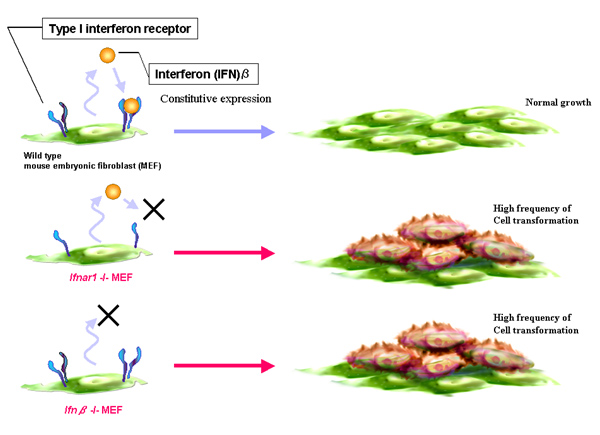A critical role for constitutive type I interferon signaling in the prevention of cellular transformation
Interferon (IFN)-α/β is produced by cells upon viral infection to protect host cells from viral replication. In contrast to the massive IFN-α/β induced by viral infection, there have been intriguing observations that constitutive expression of IFN-α/β occurs in the absence of viral infection, albeit at very low levels. This weak IFN-α/β activation renders cells to mount rapid and effective responses to environmental changes in host defence. In this research, we showed that this weak, constitutively activated IFN-α/β signal has a preventive role in cellular transformation. Ifnar1-/- mouse embryonic fibroblasts (MEFs), which are devoid of any IFN-α/β signals, undergo a spontaneous transformation during long-term cell culture.
These spontaneous transformed Ifnar1-/- MEFs show tumorigenicity after being injected into immunocompromised nude mice. Also, transplantation of Ifnar1-/- MEFs that overexpress active c-Ha-Ras oncoprotein reveals tumorigenesis in nude mice. Furthermore, DMBA-induced skin papilloma model is used to evaluate the role IFNAR1 plays in tumor suppression in vivo. After DMBA treatment, Ifnar1-/- mice are vulnerable to develop DMBA-induced skin papilloma in a higher incidence. Among all, the present study shows the importance of a weak signal by constitutively produced IFN-α/β to prevent cells from malignant transformation. Further study is imperative for the underlying mechanisms and may provide important views for cancer therapy and prevention.
Program member
Tadatsugu Taniguchi (Department of Immunology,Graduate School of Medicine)

High frequency of cell transformation in Ifnar1 or Ifnβ null MEFs.
